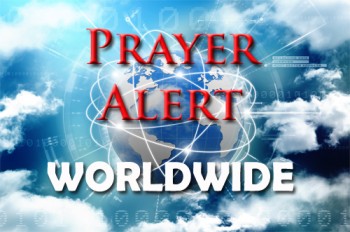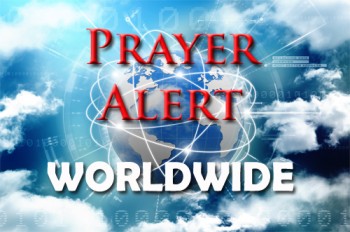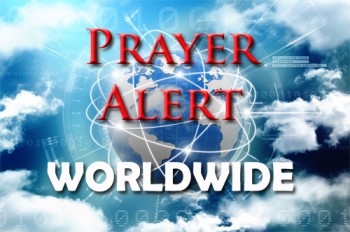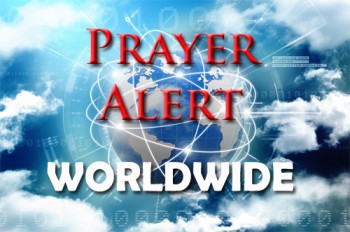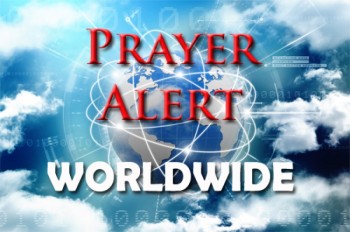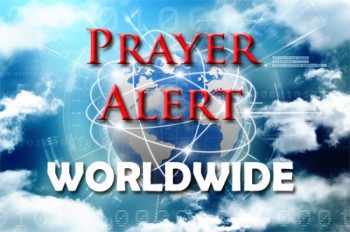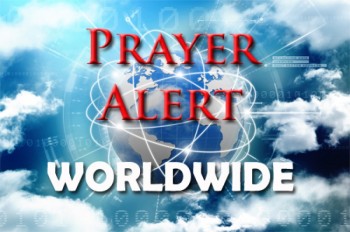Displaying items by tag: Africa
DR Congo: militants kidnap 200+, loot hospital
Over 200 people including women and children were abducted and a church mission hospital and shops were looted when Islamist extremists raided the town of Boga, in this majority-Christian country. Bishop William Bahemuka said the Muslim ADF militia had attacked the town in the early hours. During the three-hour assault, there are conflicting reports about how much the army resisted the militants, as no casualties were reported. People are terrified. Families are traumatised and grieving over their abducted loved ones. The ADF has never been active in Boga, so people are confused and can’t understand the current situation. Bishop Bahemuka said, ‘I appeal to people of good will everywhere to lobby their home governments to put pressure on our government to stabilise the security situation. We also appeal for a massive outpouring of sustained prayer from Christians everywhere.’
Uganda: Christian persecution
Charity struggled with depression after her husband became a Muslim, abandoned her, and threatened to take their three children. ‘I just couldn’t let my children become Muslims, but I trusted the Lord to help us through this challenge’, she said. Her prayers were answered when a mission worker gave her persecution-response support. Charity’s children are now in school, and her financial burden is lightened. She asks us to pray that her husband will return to the Lord. Pray also for Sharifa, a Christian who was forced to flee home because she converted from Islam. 20-year-old Asuman needs your prayers. He was beaten and disowned by his family for becoming a Christian. In East Uganda a Christian primary school in the predominately Muslim Kabuna village was demolished because it educates Christian children who converted from Islam and whose parents remain Muslim. Christians across Uganda are experiencing death threats and chaos.
Sudan: deposed president facing corruption charges
Sudan's ruling military council and civilian opposition alliance have signed a landmark power-sharing deal and Khartoum civilians have celebrated in the streets, dancing and waving their national flag. Omar al-Bashir, the former president of Sudan, will now face a long jail term if his high profile corruption trial finds him guilty of possessing foreign currency, corruption, receiving gifts illegally, and systematic human rights abuses.
Africa: protecting wildlife and timber
Ending the illegal timber trade in Africa should be the first order of business at the G7 summit (see the article in Europe section). There is no wildlife sustainability when timber traffickers and their powerful backers get away with their crimes. Gambia, Madagascar and Senegal all have new governments, who must take steps against impunity for illegal timber trading. Before any new trade proposals can move forward, these countries must start holding perpetrators of past crimes to account. In the Gambia, US$325 million worth of illegal timber went through its ports from 2010 to 2016. Its former president took advantage of poverty and instability at the border to gain control of the illegal rosewood trade from neighbouring Senegal.
Zimbabwe: governance crisis and church aid
Far from seeing reform after Robert Mugabe was toppled, the country has fallen into deeper crisis as millions are ‘reduced to paupers’. Power cuts from dawn to long after dusk are causing families to cook on firewood in almost total darkness. Monthly earnings barely cover two weeks’ living expenses. With Mnangagwa things have gone from bad to worse with outlandish austerity measures causing 175% inflation. Multiple currencies replaced by another new Zimbabwe dollar, fuel subsidies cut, poor harvests, a cyclone and drought have compounded problems. The Zimbabwe Church is calling for the international community and the government to hear the cries of Zimbabwean families surviving on two meals a day and lacking life-saving medicine. UK aid agency CAFOD is asking for national dialogue, for all in authority to come together and address the current crisis as they do what they can to assist with food, clean water supplies, and seeds (70% of the population grow their own food).
Algeria: churches being closed
The World Evangelical Alliance (WEA) has called on Algerian authorities to guarantee freedom of worship to churches and religious institutions, and to allow all closed churches to re-open. A press release on 12 August states, ‘We deeply regret that in May and in August 2019 two churches were forcibly closed in the city of Boudjima. This brings the number of forcibly closed churches to six, including one house church. Five of them belong to the Protestant Church of Algeria, a WEA member. Many more churches are threatened with closure, amid denial of formal registration and recognition by authorities. We also call on the Algerian authorities to suspend and revise the February 2006 ordinance setting out the conditions and rules for the exercise of non-Muslim religions. This ordinance is cited in each of the decisions to close churches.’
Malawi: Christians praying as streets experience unrest
Malawi has been in a week of repentance and prayer for peace ( 5 – 11 August) in response to ongoing post-election unrest and riots over allegedly rigged presidential elections. As intercessors pray for their country, peaceful protesters took to the streets of the nation’s four main cities in a call for the resignation of the embattled electoral commission chairperson. However commentators are calling for deep soul-searching to bring back sanity in the streets as criminal elements are taking advantage of the demonstrations to burn tyres, clash with police, loot shops, and torch government premises and property. They blame Pastor Dr Jane Ansah for alleged election fraud involving doctoring election papers with Tippex. Ansah maintains her innocence and says she will not bow to ‘mob justice’. The Constitutional Court in Lilongwe started a case on 8 August in which opposition parties have applied for the nullification of the election results and a rerun of the elections. The hearing is expected to last for 24 days. See
Sierra Leone: Blood diamonds and land corruption
Koidu Town’s processing plants and surrounding earthworks create a rich diamond mine. Since the 1930s it has brought employment and prosperity to the region but it fell into the hands of South African mercenaries during the civil war and has been a private enterprise ever since. Koidu Limited took control of the mine in early 2000, evicting hundreds of residents from their homes leaving them destitute, to make way for the expanding diamond mine. Local leaders and land administrators did not uphold citizens’ land rights or protect their homes. The hundreds of millions of dollars generated by the extraction of diamonds continues to leave the community and the country with no benefits. Recently Transparency International has been working to expose the corporate corruption and bring justice to those evicted and living as refugees. Pray for the promises of running water, schools, clinics and recreation grounds to be honoured and the homeless to be compensated.
South Africa: Johannesburg riot
Foreign street vendors have clashed with Johannesburg police attempting to seize counterfeit goods. An armed police vehicle was pelted with stones and rubbish bins by street vendors accusing the police of terrorising them after the raid turned into violence and petrol bombing. The police retaliated by firing rubber bullets to disperse the protesters. The African Council of Hawkers and Informal Business condemns the brutality against Hawkers by the Johannesburg Metro Police and South African Police Service. SABC News reported, ‘the police were not attacking but trying to evict the illegal vendors from a congested area in town’. The ANC condemns stoning, petrol bombing and attacks on police by foreign nationals. Police are continuing with raids to remove counterfeit goods in Johannesburg and across the country. South Africa is complex. Locals resent migrant street traders, many sell contraband / fake / illegally imported goods. Many distrust corrupt authorities and there is high unemployment. Disputes quickly escalate into a riot.
Muslims save Christians from attack
In Kenya a group of local Muslims alerted twenty, mostly Christian, construction workers to an attack by a jihadist fundamentalist group. The workers were building a hospital when the Muslims warned them to leave the site quickly and helped them do so. The area is usually very hostile towards Christians, and believers who come from other areas for work or ministry face harassment and are continuously targeted by al-Shabaab attacks. Pray for God’s protection over those who took this bold move.

